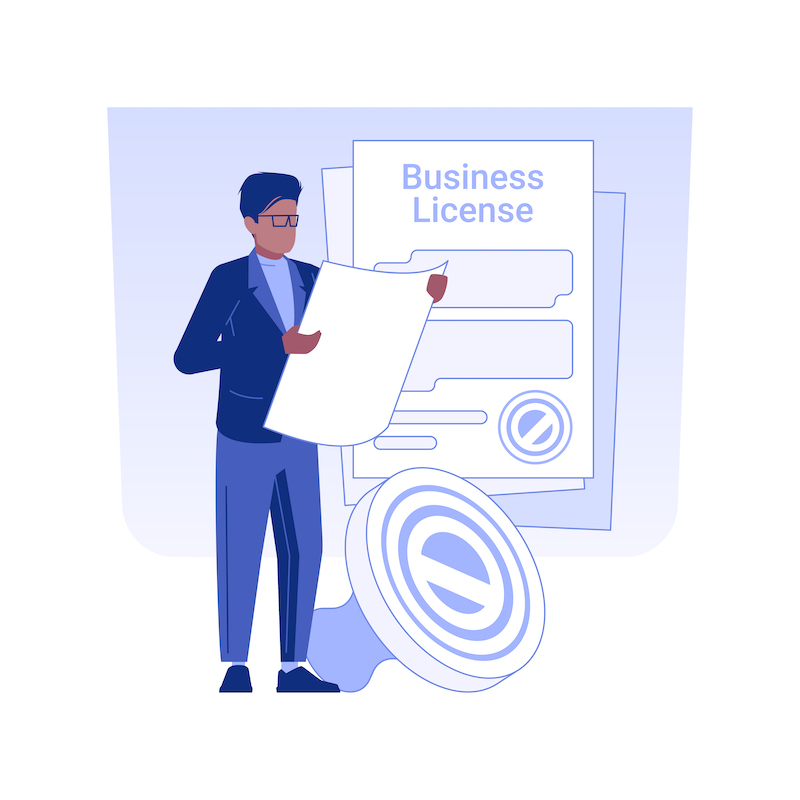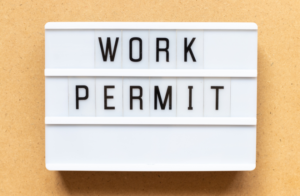Depending on the nature of your business or industry, you might be required to acquire a license or permit before operating in Singapore. A business license is an official document issued by the relevant government bodies, giving your company formal permission to conduct activities regulated under Singapore law.
Once you have registered your company with the Accounting and Corporate Regulatory Authority (ACRA) in Singapore, the next step is to obtain and apply for business permits and licenses for your business category.
Business licenses and permits are essential for your Singapore company because:
- It allows the government to exercise control, ensure compliance with rules, ensure the quality of service or products, and regulate business activities.
- Failure to apply for the proper license or permit can lead to serious fines, disbarment, and a shutdown, and any of these can affect your company’s image.
Types of Business Licenses and Permits in Singapore
There are three types of business licenses and permits in Singapore:
1. Compulsory Licenses
Compulsory licenses must be acquired by certain types of companies in Singapore before they can begin any operation. For example, suppose you wish to establish a real estate company, educational institution, travel agency, food and beverage establishment or financial institution. In that case, you must apply for a license before starting operations in Singapore.
2. Occupational Licenses for Professional Services
Occupational licenses are required before you can work in certain professions. You can obtain this occupational license from the professional organisation governing your particular profession. For example, doctors, lawyers, accountants, architects, pilots etc., can apply for a license from their own governing bodies.
3. Business Activity Licenses and Permits
Some business activities require specific licenses or permits to operate legally.
Things to note:
- Foreigners must obtain an employment pass (EP) or an EntrePass pass before submitting a business license application.
- Two or more licenses may be necessary for some business activities. Therefore, do not mistake an industry-specific business license for a compulsory license, as both may be needed to operate your business.
Businesses that Require Industry-Specific Licenses
Retail Business
Licensing requirements for retail businesses depend on the nature of the goods and services you intend to offer. Your business qualifies as a retail shop when you sell merchandise and goods directly to consumers. Below, you can see two types of retail stores that need to apply for a business license:
- Pharmacies will need a license issued by the Health Sciences Authority.
- Telecommunications stores will need a permit from Infocomm Media Development Authority.
Trading Activities
After incorporating their trading business in Singapore, all importers, exporters and trading companies must activate their accounts with Singapore Customs before starting on the importation and exportation of goods.
Note that the application process can vary from a few days to a matter of weeks. However, once done, you will be issued a Customs Approval Letter, valid for as long as your company is active.
If you fall under the categories listed below, your company has to apply for a permit:
- Import/export of all goods.
- Import/export of controlled goods.
- Import of high-technology items.
- Export, transhipment, or transit of strategic goods.
- Export of local goods.
Running a Spa
You need to apply for a Massage Establishment License to set up a spa as a business and offer massage services. You can only provide massage, foot reflexology, manicure, spa baths, or other similar treatments and services as part of your spa offerings after obtaining this license.
F&B (Food and Beverage) Business – Including Liquor Licenses
Singapore is famous for having and being able to appreciate all types of cuisines. The country is often considered a food haven. From Italian to Chinese, there’s a niche for you. However, business licenses/permits are more complex when it comes to the food & beverage (F&B) industry.
New food service business owners will need to get a food shop license from the National Environment Agency (NEA) after their incorporation before they can start to sell food or drinks. After finalising a location for your business, authorities will have to check and inspect it before giving approval for the food shop license.
Note that a company must register for GST before starting its business if they have met the criteria for doing so. Listed below are a few more licenses relating to the food business which you can apply for:
- Halal certification: Majlis Ugama Islam Singapura (MUIS) issues Halal Certificates based on a set of systems-focused Halal Certification requirements known as the Singapore Muis Halal Quality Management System (HalMQ). MUIS schemes span the entire food supply chain.
- Import-export license for food products: If you wish to import fresh food products (meat, fish, fresh fruits, vegetables, etc.), you must apply for the relevant trader’s licence from the SFA.
Travel Agency
To start a travel agency in Singapore, you must get a travel agent license. There are two types of travel agency licenses available, and you can choose to get the one that best suits you and your company:
- Niche License: (lower minimum financial requirements) Agents who intend to sell, arrange or advertise tours only within Singapore and provide conveyance to passengers but without any right of accommodation.
- General License: (higher financial requirements) Agents who will conduct other activities beyond the scope of a Niche License (e.g. tours out of Singapore).
Real Estate Business
With the growth of the real estate industry over the years, a new statutory board has been set up to achieve better regulation of the real estate industry and raise professional standards (in the interest of consumers). This new structure has a few key features, such as:
- Enhanced licensing requirements for real estate agencies.
- Compulsory registration of real estate agents.
- New industry regulations.
- All real estate businesses need to obtain a license from the Council of Estate Agencies.
Education (Including Childcare and Kindergartens)
There are specific mandatory licenses that you need to obtain to start an education business, like childcare centres, kindergartens, academic schools and non-academic schools in Singapore.
The critical requirement for education businesses is that all private establishments (except non-academic schools) providing their service to ten or more people have to register either with the Ministry of Education or Council for Private Education (CPE), depending on the type of educational establishment they belong to.
Publishing
For running a publishing industry in Singapore, examples of licenses required include a Newspaper Permit from the Infocomm Media Development Authority (IMDA) for printing and publishing newsletters, a Printing Press License for operating a printing press, and more.
Hotel Business
Apart from the main Hotel-Keeper’s License and approval from the Hotels Licensing Board, you need other licenses and permissions to set up a hotel or boarding house in Singapore. For example, you will need permits or licenses for the following activities: housing TVs, organising ad-hoc entertainment, playing copyrighted music or videos, running a spa, selling tobacco products, operating a swimming pool, etc.
Application Procedures for Securing a Business Permit/License in Singapore
When applying for a business license or permit in Singapore, here are the steps to follow:
- Find your desired license to apply by using the ‘keyword’ or ‘business intent’ search on the gobusiness licensing.
- Add the license and proceed to apply. (You will need a Corppass or Singpass to log in; otherwise, you can use the business licensing ID for foreigners).
- Enter the general information and agree to the terms and conditions.
- Fill in the required application form for the license corresponding to your business.
- Attach supporting document(s) required as part of the application.
- Submit your application.
Conclusion
Singapore is a popular place for start-ups because of the ease of doing business. Establishing a business is faster and easier than applying for licenses and permits. However, if you provide all the necessary documentation and can comply with all other requirements, you can be sure that your license will be approved.
Using a corporate service firm to assist with the license application is best, as that would help you save on time and resources.




